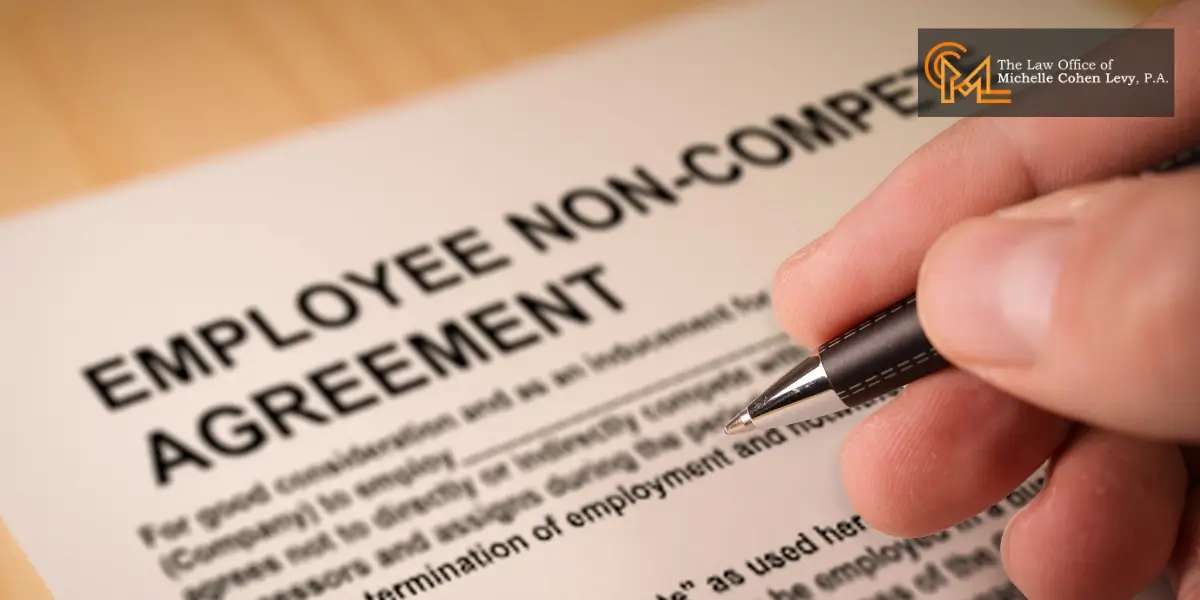The cost of a non-compete lawyer depends on several factors, such as case complexity, attorney experience level, and geographic location. While some lawyers bill their clients by the hour, others provide flat fees specifically for contract review and consultation services. During an initial meeting with the lawyer, inquire about their fee structure to understand possible costs.
Hollywood Non-Compete Lawyer
Hollywood Non-Compete Attorney

Multiple industries use employment contracts that contain non-compete agreements to protect legitimate business interests by stopping departing employees from entering into competition. Residents of Hollywood who face questions about non-compete agreements or need representation in legal disputes can consult a Hollywood non-compete lawyer to explore their legal rights.
Choosing The Law Office of Michelle Cohen Levy, P.A.
The Hollywood employment lawyer at The Law Office of Michelle Cohen Levy, P.A. possesses extensive experience managing diverse employment law cases throughout Hollywood and neighboring regions in Florida.
Employees who must sign non-compete agreements believe these contracts are unjust because they bind them to their current jobs while blocking their ability to seek other career opportunities. The reality is more complex than it seems, and understanding contract details is where we come in.
Florida courts enforce non-compete contracts when they are precise, yet excessively broad or unreasonable agreements won’t stand up to legal scrutiny. Our firm is prepared to examine your non-compete agreement while helping you identify your legal choices should you worry about breaching the terms of the agreement and facing the consequences.
Understanding Non-Compete Agreements in Florida
While many states have placed restrictions or complete prohibitions on these agreements, Florida stands out as one of the most business-friendly regions for enforcing non-compete contracts. The enforceability of non-compete agreements in Florida depends on the agreement satisfying multiple legal requirements.
The agreement should serve to safeguard a legitimate business interest, which includes things like trade secrets or specific training. The duration of the agreement should remain reasonable and typically span between six months and two years, since courts view longer agreements as excessive.
The geographical limits of the restriction should remain reasonable and avoid being excessively broad without proper justification. A non-compete agreement needs to articulate precise limitations that correspond to the particular job responsibilities of the employee. Florida courts can modify non-compete agreements that exceed reasonable boundaries instead of invalidating them completely.
According to two recent nationally representative studies reviewed by the United States Government Accountability Office (GAO), 18 percent of workers currently have non-compete agreements, while one study found that 38 percent of workers had experienced such agreements during their careers.
According to GAO’s survey responses from 446 private sector employers, more than fifty percent confirmed that they used non-compete agreements for some of their workforce.
Employee Rights and Considerations
Employees who receive a non-compete agreement in Hollywood, Florida need to learn about their legal rights before they sign the document. Florida law allows enforcement of these agreements, but they don’t hold absolute power. Employees can challenge the reasonableness of non-compete terms and evaluate their necessity for legitimate business interests.
Employers must demonstrate that the agreement addresses particular business needs, including the protection of trade secrets and customer relationship maintenance. You need to check if the time period and geographic limitations, along with work restrictions, fit the position you were recruited to do.
Non-compete agreements that impose long-term restrictions or cover large geographic areas may fail to hold up in legal proceedings. The courts of Florida evaluate each case individually to decide what constitutes reasonable terms.
Before making employment changes or launching your own business, you need to understand your legal standing if you have signed a non-compete agreement. Infringement of a legitimate non-compete agreement may trigger legal actions, such as injunctions or financial penalties. Courts sometimes modify agreements instead of invalidating them completely, which still limits your professional freedom.
How a Lawyer Can Help
Understanding non-compete agreements in Florida usually demands the assistance of a skilled employment attorney. A lawyer can analyze your contract terms while explaining Florida legal principles to help determine if your agreement holds legal validity. A lawyer can help you renegotiate better terms before you sign the agreement and can defend you in court should any legal issue occur.
Local legal resources prove essential when you need help with legal disputes or professional advice. Courts like the Broward County 17th Judicial Circuit, Miami-Dade Eleventh Judicial Circuit, and Palm Beach County Fifteenth Judicial Circuit handle most employment disputes in South Florida.
A local attorney will provide you with knowledge about Florida’s employer-friendly laws and geographical court preferences. Legal assistance helps protect your rights while providing peace of mind during career transitions and contract discussions.
Need Legal Help? Click Here to Take the First Step!
FAQs
Contact The Law Office of Michelle Cohen Levy, P.A. Today
If you’re facing a non-compete agreement or dealing with a dispute, don’t navigate it alone. Contact The Law Office of Michelle Cohen Levy, P.A., today to schedule a consultation and protect your rights and career.
Contact An Attorney
Committed To Your Interests
I offer free initial phone consultations for all legal matters. I invite you to schedule your assessment today
by completing my online contact form or by calling my Lighthouse Point office at 954-651-9196.

